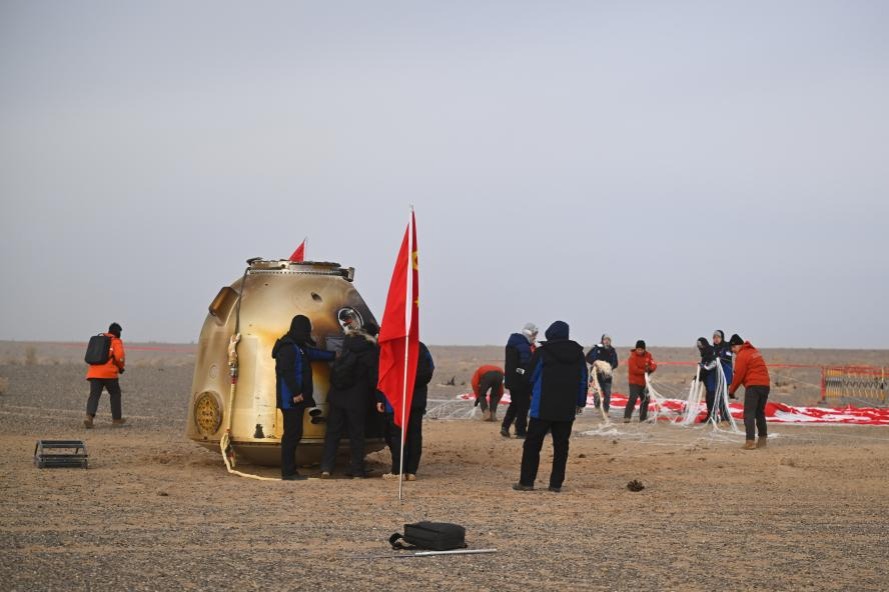City dwellers live a modern rural dream in Guizhou

| A dairy goat farm of Guiyang Shengheng Ecological Agriculture Development Co Ltd in Xiuwen, Guizhou province. Gao Anming / China Daily |
Chashan village approach to development belies region's backward image
At first glance, the narrow, long-winding dirt road that leads to Chashan village looks no different from anywhere else in rural China. But the lush green meadows, herds of livestock grazing contentedly, and rows and rows of gray cement kiwi fruit trellis on either side of the road that you chance upon after arrival in the village have a different story to tell.
It is the story of how a few resolute individuals beat the odds to put the remote rural village in mountainous Xiuwen county, in Southwest China's Guizhou province, at the forefront of sustainable rural development in China.
"Eight parts hills, one part water and one part land" is how the rugged terrain of Guizhou is often referred to in China.
Despite its rich flora and fauna, Guizhou is considered to be one of the most economically backward and underdeveloped provinces in China. But Chashan wants to be known for using modern, sustainable agricultural techniques to make a big difference.
Though the village is still steeped in the old, there are visible signs of modernity. Visitors undergo sanitization procedures at a spray sterilization room before they are allowed to see the 400 dairy goats that are grazing in the lush grassland at the foot of a hill.
Though grazing reduces milk out-put by 30 percent, compared with raising goats in confinement, the villagers believe that the New Zealand-style of breeding will give it the coveted high-end green product tag. Further evidence of modernization is visible in the form of the New Zealand-designed Waikato system used to milk the goats.
The dairy farm is part of Guiyang Shengheng Ecological Agriculture Development Co Ltd, an agricultural startup established by four young professionals who gave up their promising urban careers for a tryst with the unknown in Chashan.
The four young executives of Shengheng, all born around 1980, style themselves as real-world "Chinese rural partners".

Ning Weihua, 34, Shengheng's chairman as well as head of Chashan village, recollects the early days when he invited several agricultural experts to discuss the way forward for Chashan and the road it should take for sustainable development.
According to Ning, the experts were unanimous in the opinion that Chashan should use its natural resources to full advantage. The roadmap outlined by these experts hinged on increasing farming and developing leisure agricultural tourism.
"Cities are for making a living and countries are for living a life," says Ning. He says that his goal is to ensure that Chashan has a modern infrastructure without sacrificing its idyllic country life.
That was something easier said than done, says Ning, adding that his first task was to conduct an opinion poll among the village's 284 households on the kind of jobs and the remuneration they expected.
"We provided job options such as cattle breeding, dairy goat raising, rural tourism, bed and breakfast, support crews and construction. The expected remuneration of farmers for these jobs ranged from 5,000 yuan ($800; 598 euros) to 72,000 yuan a year.
Ning says they want to help the villagers build competitiveness to sustain themselves by taking the agricultural development route for growth.
Ning, who only finished three years of elementary school, has spent lots of time and effort to attract good professional talent for Shengheng, a key factor in its successful operations.
One such person is Wang Haibin, 34, the company's technical supervisor for its goat project, who was earlier a researcher with the Guiyang agricultural department and a graduate of Northwest Agriculture and Forestry University.
Wang admits that Chashan has been an ideal place to put his knowledge to the test. He started a goat-raising business earlier with other partners but failed because of a lack of capital.
The milk output at the goat farm is about 250 kilograms a day. Most of the dairy goats are of the Saanen breed, and Wang is working on nurturing a local breed so that more farmers can participate in goat raising and increase the output.
Unlike Wang, Luo Hongwei, a former department manager of Pudong Development Bank Co Ltd in Shanghai, would have never given a second thought or dreamed that he would resettle from the nation's financial center to a small backward village in Guizhou.
Luo's father-in-law was a supplier of Shengheng, who says good things about Ning and made the introduction.
"After almost three days' conversation through day and night, I was deeply touched by Ning's dream - a dream to change rural lives, and I decided to join," Luo says.
He is now in charge of marketing and financing issues for Shengheng.
The three team leaders found Liu Qingchun, who became deputy general manager of Shengheng, through an article Liu posted on the website about agricultural investment and agricultural industry park. Liu calls himself a big fan of rural investment, and he owned an agricultural base in Chengdu, Sichuan province.
After a phone conversation, the three drove directly to Liu's place in Chengdu. Similarly, after three days and two nights of conversation that brought only six hours for sleep, they welcomed Liu as the newest member of the team.
"I saw too many agricultural investors who were actually real estate developers; we really want to develop a unique model and a circular economy for Chashan," says Liu.
Many of their friends do not understand their choice, and all of their wives are still in cities as the rural village is too backward in terms of education for their children.
The company has set up a dairy bar in Guiyang, the provincial capital, to supply milk, yogurt, pudding and cheese. The total number of the bars in Guiyang will eventually reach 20, and they are looking for dealers in other cities, according to Ning.
Other industries in Shengheng includes a pig farm with about 1,800 pigs, which has already turned a profit, and flower and kiwi fruit plantations.
According to Ning, about 150 million yuan has been invested in the redevelopment of Chashan, and indications are that the total outlay will hit 2 billion yuan by 2017.
"Funding is not an issue," says Ning. "The important thing is to know how to leverage the capital."
But he also says that financing such projects is not an easy task because they come with many risks and a long gestation period.
"We have been lucky, "he says. "Our projects have been supported by the local government, and it has provided funds for the construction of infrastructure like roads."
The local government support also extended into naming Shengheng as a provincial-level demonstration agricultural park. In addition, a local commercial bank has ensured financing of more than 200 million yuan.
Land is the most important asset for farmers. Shengheng is renting farmers' land, and Ning says his goal is to make farmers in Chashan share-holders of Shengheng and centralize the management of the village's land in the coming years. Thus farmers could get a rental income, a salary for working for the company and a bonus if the company makes a profit.
Shengheng, currently a private company, was established for the benefit of the villagers. Ning says that his goal is to ensure basic welfare for children and senior citizens of the village.
Xu Xiaoqing, director of department for rural economic development at the State Council's Development Research Center, says the practice of turning villagers into shareholders has been replicated in other places, such as Xiabo village in Foshan, Guangdong province.
"It (pooling land as shares) is a good effort to bring the villages out of poverty. But there are also risks like the performance of the enterprise," says Xu.
Lots of land was used for building factories in Xiabo and the village's development stagnated after years of hectic development.
"We won't damage the cultivated land no matter how well Chashan develops since that's not sustainable development," Ning says.
Yang Jun and Su Jiangyuan contributed to this story.
lanlan@chinadaily.com.cn
(China Daily Africa Weekly 08/08/2014 page22)
Today's Top News
- Wake-up call for Europe to review its dependency: China Daily editorial
- China reports 5% GDP growth in 2025
- Return capsule of Shenzhou XX safely returns to Earth
- Sanya rises as magnet for Russian tourists
- China's steady opening-up for Asia-Pacific economic growth
- Blueprint seen as a boon for entire world






























